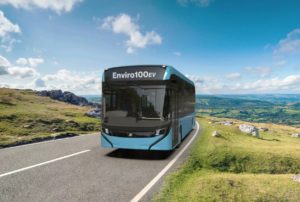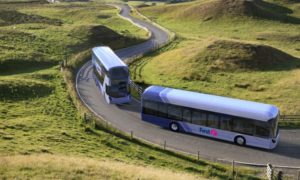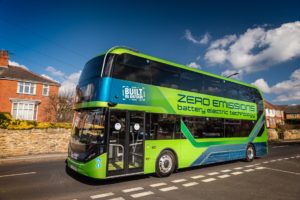
The second round of the Zero Emission Bus Regional Areas programme (ZEBRA2) in England was launched by the Department for Transport (DfT), with up to £89m and £40,000 earmarked for 2023/24 and 2024/25 respectively in a £129m package.
Of that money, the first £25m will be prioritised for rural communities, with DfT recognising that in remote areas, building the infrastructure needed for the buses is more expensive. Minibuses are included in this new round of funding, which will greatly support rural and on demand services.
With the majority of zero emission buses currently deployed in London, ZEBRA aims to level up and support buses across the country, and the second round of funding means that more regions and communities are set to benefit. However, the task of planning infrastructure, navigating the application process and completing the operational roll-out of vehicles continue to be barriers for local authorities to access the scheme, with just 17 out of 48 eligible regions having received funding during the first round.
The majority of those vehicles that have been funded are yet to reach the road, underlining that fact that funding alone is not enough – local authorities must receive technical support too, particularly to plan infrastructure and identify suitable routes.
Transport Secretary Mark Harper said: “This funding for more zero emission buses will help decarbonise public transport and grow the economy by keeping our communities connected.
“This additional funding will improve journeys for even more passengers, reaching those in the most remote areas.”
ZEBRA2 applications, which opened on 8 September, will again be led by local transport authorities (LTAs) across England outside London, and those that did not receive money from previous funding rounds will be prioritised.
The deadline for submission is 15 December and a Q&A session with DfT bid reviewers will take place from mid-January 2024.
Decisions on successful bidders are due in March 2024, with funding for 2023/24 to be awarded by that month and for 2024/25 by a year later.
Vehicle orders must be placed by 31 January 2025.
ZEBRA2 will fund up to 75% of the incremental price of a zero-emission bus over a diesel equivalent, and up to 75% of total infrastructure capital expenditure, and there is no minimum or maximum bid size.
While zero-emission coaches are specifically ruled out of eligibility, zero-emission, accessible minibuses used on local services are within scope.
Also, battery electric and hydrogen fuel cell-electric technologies are eligible for support.
However, in recognition that hydrogen is at an earlier stage of commercial deployment, such buses can be funded even if they are assessed to be poor value for money via a new greener bus tool, subject to them offering “a genuine learning and innovation opportunity.”
For battery electric buses to be funded, they must achieve at least a low value for money rating.
Paul Davies, Alexander Dennis President and Managing Director, said the success of its Scarborough bus-manufacturing site is a prime example of how government investment in zero emission buses can support communities across the country.
He added: “We provide thousands of skilled jobs and apprenticeship opportunities in an industry that is firmly looking ahead to a sustainable future for us all.
“Our next-generation electric buses are ready to support councils’ ZEBRA 2 bids, including the innovative Alexander Dennis Enviro100EV, which is particularly suited to efficiently provide zero-emission mobility for rural communities.”
Bus Minister Richard Holden, who recently visited the Alexander Dennis plant, said: “This brings our total investment in new zero-emission buses to almost £500 million, helping to kick-start a new generation of bus manufacturing in the UK and create good, high-quality jobs from Scarborough to Falkirk.
“We’re leading the way by ensuring that Britain can take advantage of high-skill manufacturing while delivering cleaner public transport for passengers across the country.”
ZEBRA2’s increased focus on rural areas coincides with the creation of the Confederation of Passenger Transport’s (CPT) Rural Zero Emission Bus Taskforce earlier this year, designed to help rural bus services make a smooth and sustainable transition to zero emission technologies.
The taskforce aims to explore decarbonisation challenges in rural areas by bringing together bus operators, local transport authorities, the Department for Transport as well as infrastructure providers to identify practical solutions.
According to the CPT, the current range of electric batteries, and lack of refuelling and charging points on roads and in depots, all pose a challenge to operators that run longer distance zero emission vehicles across rural communities.
Alison Edwards, CPT Director of Policy, said: “We welcome the government’s announcement of further government funding for zero emission buses. Buses have a huge role to play in helping the UK meet its decarbonisation goals.
“We are pleased that the prioritisation of rural bus services in the bidding process recognises the challenges facing these operators.”

A further £25.3 million was released in March to existing successful bids.
RESEARCH HUB
Meanwhile, the DfT has also announced the creation of a new research centre, backed by £10m in funding from the DfT, National Highways, HS2, Network Rail and UK Research and Innovation (UKRI), to develop ideas to ensure future transport infrastructure is low-carbon and resilient.
Newcastle University, Heriot-Watt University, University of Cambridge and University of Glasgow have been awarded the funding to establish the Net Zero Transport for a Resilient Future Hub, which will be the national focus for research into how the UK decarbonises and makes resilient its transport infrastructure.
Professor Phil Blythe CBE, Professor of Intelligent Transport Systems and head of the Future Mobility Group, Newcastle University, said: “The hub will engage widely to bring together the leading academics from across the UK and their civic and industry partners so we can focus on understanding the underpinning science and engineering to enable us to tackle these real challenges and provide the models that will help us understand the impact and find the most appropriate solutions.”
New buses funded through the ZEBRA2 scheme should help entice more passengers back on board, and connect communities by getting more people to work or college.
These vehicles will also address environmental concerns, especially in towns and cities, while giving a boost to British automotive manufacturing.









